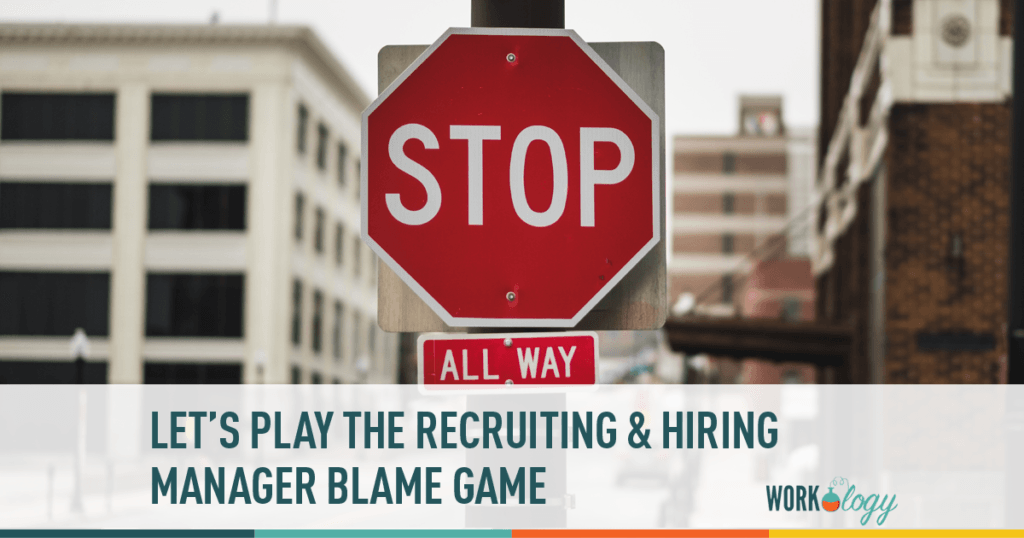The use of recruiting and HR as your employee performance scapegoats is no more. I’m tired of being thrown under the bus.
The blame game lies with the misunderstanding of HR, Recruiting, and the expectations that are set. Yes, there are crappy recruiters out there, but there are good ones as well. If I don’t have the right technology to do my job or a good relationship with a hiring manager, I can’t recruit for them effectively. No amount of powerpoint presentations, excel spreadsheets and strongly worded conference calls is going to help me recruit effectively. The solution starts with a conversation between the hiring manager and recruiting.
HR, recruiters, business leaders and hiring manager are all on the same team, your company.
Who’s to Blame for Bad Hires?
In my experience, hiring managers like to pass the buck on to the recruiters who are responsible for delivering the message to the candidate and often times have to piece mill together a targeted candidate list when the hiring manager has no information at all. The hiring manager doesn’t even know what their team member exactly does but they want that position filled immediately. Even before I get a candidate list in front of them, expectations have already not been met. Add in juggling trying to find the time to actually work time in for the manager to meet with your best candidates for the job. Company low balls an offer because they are a “best place to work,” and I get the blame. I’m sick and tired of being the scape goat for subpar managers who can’t meet productivity and production expectations for my company.
Bad Recruiters Don’t Use HR Metrics
On the other hand, recruiters don’t solicit feedback or consider turnover as an human capital and HR metrics worth measuring or even monitoring. The belief is that once that offer is accepted, the new employee is no longer the concern of recruiting.
For years, recruiters have been used as the scape goat for hiring managers when a job isn’t filled. Increased use of technology and innovation holds the recruiter accountable yes, but more importantly it holds the hiring manager accountable for their actions. Recruiting and HR teams can also use human resource metrics like quality of hire, time to fill and turnover percentages based on tenure mapped onto of the new employee’s own productivity and survey data outlining their satisfaction and preparedness with orientation, training and on boarding.
Business leaders who should not be so quick to blame HR for bad hiring. I recommend a multi-facted approach that involves evaluating exit interviews, focus group data and looking at how your front line managers are motivating and developing their own teams. It might be time to invest in some actually manager and development leadership training.
When Good Hiring and Recruiting Happens
Good hiring and recruiting happens when teams work together. They communicate and work towards a goal seamlessly. If hiring managers are having problems with your recruiting or HR team, sit down with them and learn what they do. Ask questions, develop a relationship, and work to help them to their job better. Same goes for recruiting. It might mean spending more time with the recruiter before the job is posted so they can effectively qualify the candidate you want and need. I’ve sat with regional sales reps for 3 days and learned everything I could about the business so I could find the best talent at the lowest cost for them. That solution wasn’t enough. In order to achieve results, it required a combined effort that included the development of a new interview guide and new recruitment messaging to reach the job seeker that was the best fit for our team. Determining that fit starts with a relationship, a conversation and an understanding between hiring managers, business leaders and recruiting.










One Comment
Amen for accountability!
If I’ve said it once I’ve said it a million times: RECRUITERS DON’T MAKE HIRING DECISIONS – THE HIRING MANAGER DOES! People love love love to blame recruiters when they are not the one who selected to make the offer to the candidate. The blame must always be placed squarely on the shoulders of the manager who said “THIS is who I want to hire.” Companies love to fault recruiters, internally and externally, when the role of the recruiter is to coordinate the screening process and source for candidates beyond what’s come in from advertisements. It blows my mind that after the hiring manager selects and offers the role to someone, that if they leave or are not a good fit with the team, that suddenly the recruiter gets the blame who never ever worked with the individual nor made the decision to hire! Talk about a lack of accountability!
Good recruiters, like you said, are partners to the hiring manager. But we’re not miracle workers! 🙂
Comments are closed.